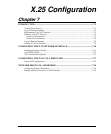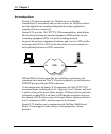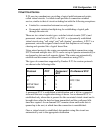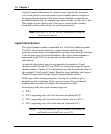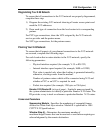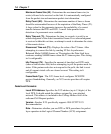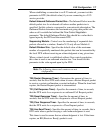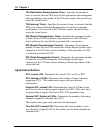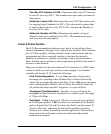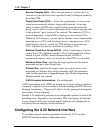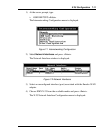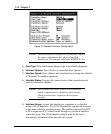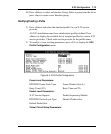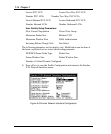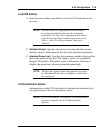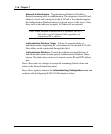
X.25 Configuration 7-9
Two Way SVC, Number of LCNs - Determines the lowest LCN that can
be used for two-way SVCs. This number must agree with your network
subscription.
Outbound, Lowest LCN - Determines the lowest LCN that can be used
for outgoing logical channels for SVCs. The value must be greater than
or equal to the Lowest two-way SVC LCNs value plus the Number of
two-way LCNs value.
Outbound, Number of LCNs - Determines the number of logical
channels reserved for outbound-only SVCs. This number must agree
with your network subscription.
Emulex X.25 User Facilities
The X.25 Recommendation addresses users' needs for versatility in their
network requirements through a set of optional user facilities. These facilities
give X.25 the capability of being tailored to meet varied network and user
requirements and allow a network installer to fine-tune the network’s
handling of such areas as security, accounting, routing, and performance.
These facilities can be selectively and incrementally specified to the needs of
the users on that network.
Many user facilities can be used within an X.25 connection to a PDN. Some
of these facilities are read-only and may not be changed. User facilities
available with Emulex X.25 include the following:
Flow Control Negotiation - If set to Yes, negotiates (downgrades)
incoming calls containing either Window Size or Packet Size facility
values that are greater than those specified. If set to
No, rejects incoming
calls containing either Window Size or Packet Size facility values that
are greater than those specified. Negotiates, on a per-call basis.
Throughput Class Negotiation - Specifies, on a per-call basis, the
throughput of data that can be transferred on a virtual circuit. The range
is 75 bps to 64 Kbps.
Fast Select - If Yes, allows up to 128 bytes of user data to be included
in Call Request packets. If
No, user data is not included in Call Request
packets Expands the Call and Clear user data fields from the normal 16
octets to 128 octets, enhancing the data field's usefulness for short-
duration, low-volume, transaction-oriented applications. This facility is
often used in the retail point-of-sale and credit card authorization
terminal environment..



